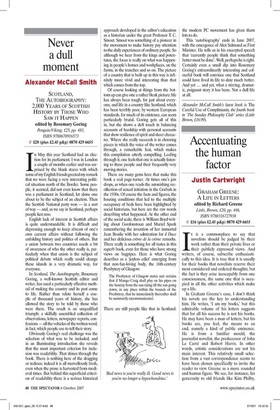Never a dull moment
Alexander McCall Smith SCOTLAND, THE AUTOBIOGRAPHY: 2,000 YEARS OF SCOTTISH HISTORY BY THOSE WHO SAW IT HAPPEN edited by Rosemary Goring Penguin/Viking, £25, pp. 483, ISBN 9780670916573 © £20 (plus £2.45 p&p) 0870 429 6655 1 n May this year Scotland had an election for its parliament. I was in London a couple of months earlier and was surprised by the blank stares with which some of my English friends greeted my remark that we were facing a very interesting political situation north of the Border. Some people, it seemed, did not even know that there was a parliament in Scotland, let alone one about to be the subject of an election. Then the Scottish National party won — in a sort of way — and, as we say in Scotland, perhaps people ken noo.
English lack of interest in Scottish affairs is quite understandable. It is difficult and depressing enough to keep abreast of one's own current affairs without following the unfolding history and politics of others. But a union between two countries needs a bit of awareness of who the other really is, particularly when that union is the subject of political debate which really could change these islands in a very dramatic way, for everyone.
In Scotland, The Autobiography, Rosemary Goring, a well-known Scottish editor and writer, has used a particularly effective method of making the country and its past come to life. Rather than relate herself a couple of thousand years of history, she has allowed the story to be told by those who were there. The result is an unqualified triumph: a skilfully assembled collection of observations, letters, newspaper reports, confessions — all the vehicles of the written word, in fact, which people use to tell their story.
Obviously Goring's real challenge was the selection of what was to be included, and in an illuminating introduction she reveals that the most important criterion for inclusion was readability. That shines through the book. There is nothing here of the dragging or tedious; indeed it is all marvellously fresh, even when the prose is harvested from medieval times. But behind this superficial criterion of readability there is a serious historical approach developed in the editor's education as a historian under the great Professor T. C. Smout. Smout was something of a pioneer in the movement to make history pay attention to the daily experiences of ordinary people. So although we hear from the kings and potentates, the focus is really on what was happening in people's homes and workplaces, on the farms, in the trenches and so on. The picture of a country that is built up in this way is infinitely more vivid and interesting than that which comes from the top.
Of course looking at things from the bottom up can give one a rather bleak picture: life has always been tough, for just about every one, and life in a country like Scotland, which has been terribly poor, by western European standards, for much of its existence, can seem particularly brutal. Goring gets all of this in, but she shows a deft touch in balancing accounts of hardship with personal accounts that show resilience of spirit and sheer character. Where she really succeeds is in choosing pieces in which the voice of the writer comes through, a remarkable feat, which makes this compilation utterly compelling. Leafing through it, one feels that one is actually listening to these people and their frequently very moving stories.
There are many gems here that make this book a real page-turner. At times one's jaw drops, as when one reads the astonishing recollection of sexual initiation in the Gorbals in the 1930s. Of course the facts and figures, the housing conditions that led to the multiple occupancy of beds have been highlighted by social historians, but here are the raw words describing what happened. At the other end of the social scale, there is William Boyd writing about Gordonstoun and Muriel Spark remembering the invention of her immortal Jean Brodie with her admiration for il Duce and her delicious creme de la creme remarks. There really is something for all tastes in this superb book, even for those who have strong views on bagpipes. Here is what Goring describes as a joyless edict' emerging from that non-fun-loving body, the 16th-century Presbytery of Glasgow: The Presbytery of Glasgow states and ordains that if Mungo Craig shall play on his pipes on the Sunday from the sun rising till the sun going down, in any place within the bounds of the Presbytery, that he immediately thereafter shall be summarily excommunicated.
the modem PC movement has given them lots to do.
This 'autobiography' ends in June 2007, with the emergence of Alex Salmond as First Minister. He tells us in his excerpted speech that 'currently people think that something better must be done'. Well, perhaps he is right. Certainly even a small dip into Rosemary Goring's extraordinarily interesting and colourful book will convince one that Scotland could have lived its life to date much better. And yet ... and yet, what a stirring, dramatic, poignant story it has been. Not a dull life at all.
Alexander McCall Smith's latest book is The Careful Use of Compliments, the fourth book in 'The Sunday Philosophy Club' series (Little Brown, £16.99).





























































 Previous page
Previous page